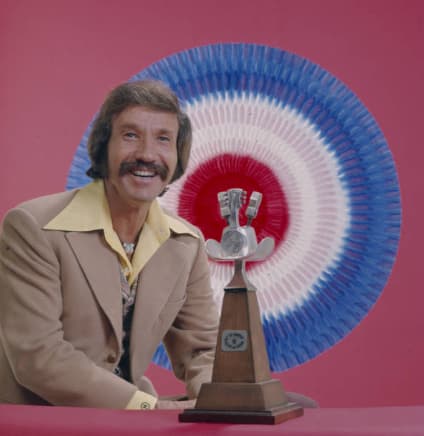
Today, if Marty Robbins were still alive, he would have turned 100 — a hundred summers cried out into life, a hundred autumns fallen in the hearts of those who listen to his music. So many miles have passed, so many songs still echo — and his life story remains like a Western ballad, both fierce and dreamlike.
🌵 The Journey from the Arizona Desert
Martin David Robinson — the real name of Marty Robbins — was born on September 26, 1925, in Glendale, Arizona. He was the sixth of nine children in a poor family, where the sound of his father’s harmonica and the frontier tales of his grandfather, “Texas Bob Heckle,” became the first map guiding his soul. His father was a laborer, and the family often moved from place to place, struggling to make ends meet. His mother and siblings carried the weight of hardship, and from a very young age, Marty learned resilience.
As a child, he was captivated by cowboy (Western) movies, especially idolizing the legendary singing cowboy Gene Autry. He once said he would sit in the front row of the theater so as not to miss the flash of gunfire or the pounding of hooves — images that later seeped into his musical dreams.
When World War II broke out, Marty joined the U.S. Navy. During his service, he taught himself to play guitar and began writing his first songs — it seemed that in those quiet moments between the waves, the music inside him slowly took shape. After the war, he returned to Phoenix, performing in small clubs and on local radio, eventually accepting an invitation to appear on the television show Western Caravan on KPHO. It was then that the name “Marty Robbins” was chosen to shape his artistic image.
One evening, Little Jimmy Dickens — a renowned artist of the Grand Ole Opry — heard Marty sing and was captivated. He helped Marty connect with Columbia Records, opening the path to a professional career for the young singer.
🎶 The Western March in Song
Marty Robbins was a man of many colors: he sang country, western, rockabilly, pop ballads, and even drew inspiration from Hawaiian music and gospel. Thanks to his warm, powerful voice, he was able to cross genre boundaries — and many times, his songs climbed the pop charts rather than staying confined to country. Over a career that spanned nearly four decades (from the late 1940s to the early 1980s), Marty had 94 solo songs chart on the Country rankings, with 16 reaching No. 1.
But if one were to name the very “soul” of Marty, many would immediately think of El Paso — the cowboy ballad of a tragic desert love story, with Feleena the Mexican dancer, the gun, love, and death. Released in 1959 on the album Gunfighter Ballads and Trail Songs, El Paso transcended every genre boundary, reaching No. 1 on both the Country and Pop charts, and earning Marty his first Grammy for “Best Country & Western Recording.” The song tells a story where one sometimes feels like a lone traveler — at once entranced and terrified, yearning and waiting, yet forced to face destiny.
From El Paso onward, Marty Robbins’ name became synonymous with the Western sound — and later songs like Big Iron, Don’t Worry, My Woman, My Woman, My Wife, and Among My Souvenirs only deepened that legacy.
🏁 The Driver, The Storyteller
Marty Robbins didn’t just live through music; he also lived through speed, through the passion of the racetrack. He once competed in NASCAR — something very rare for a singer. He raced in 35 Cup events, finishing in the Top 10 six times — an impressive record if you consider racing his “sideline” to music.
Acting also called his name: Marty appeared in cowboy films such as The Ballad of a Gunfighter (1963), Hell on Wheels (1967), and Guns of a Stranger (1973) — sometimes in small roles, sometimes as a version of himself. In Clint Eastwood’s Honkytonk Man (1982), Marty’s song Honkytonk Man was featured — and it marked his final appearance on screen.
🌄 When the Final Note Rang Out
On December 8, 1982, Marty Robbins left this world forever in Nashville, after his fourth heart attack, at the age of 57. Some say that was the way a cowboy departs — quietly, yet leaving behind an immense emptiness.
Though brief, his life carved deep footprints in the hearts of music lovers: he was a member of the Country Music Hall of Fame, honored in the Nashville Songwriters Hall of Fame, and even after his passing, his name endures — not only as an artist, but as a legend.
One hundred years — imagine if he were still here to keep singing, sitting by his guitar, the dim light casting a glow on his silver hair, eyes closed as he strummed each chord, telling stories of the desert, of love that might have been, of fate drifting through the winds of the West. Perhaps he would glance at the audience and smile — knowing that the applause, the silent gazes, would echo forever.